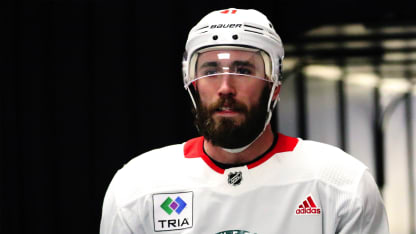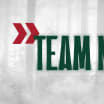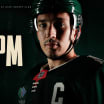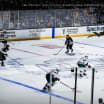In today's salary cap NHL, teams often do whatever they can to scrimp and save every penny in preparation for whatever comes down the line.
As is the case of the Wild this season, it could be injuries. Some teams may want to claim a player on waivers. For others, it may be that trade deadline move they feel puts them over the top.
Call me maybe? The unpredictable life of an NHL call-up
Injuries, tight salary cap have forced the Wild to get creative with its roster early in season

© Katlyn Gambill
That often means making tough decisions regarding usually younger, less experienced players, shuttling them back and forth between the NHL team and its American Hockey League affiliate.
Before he became an NHL regular, Wild forward Jason Zucker was assigned to Minnesota's AHL affiliate on seven different occasions, and recalled eight times, all over the span of just two seasons.
The drive south down Interstate 35 from St. Paul to Des Moines became so familiar to Zucker that some referred to the highway simply as "I-35Z."
When told how many times he had been moved back and forth, Zucker smiled.
"Is that it?" he cracked.
"It's hard, because every time, you take the news hard," Zucker said. "You don't ever want to go back. It's cliche, but it's a lot of, 'never too high, never too low.' As cliche as it is, it's true because every time you're sent down, you're down. And every time you get called up, it's elation again.
"When you get called up, you say to yourself, 'OK, I'm never going back down.' And then you get sent back down a couple games later. You have to stay as even-keeled as you can."
Just two weeks into the 2017-18 season, a few Wild players are already on the merry-go-round between Iowa and Minnesota.
Admittedly, that wasn't the plan coming into the season. But injuries to forwards Zach Parise and Mikael Granlund, then Marcus Foligno, Charlie Coyle and Nino Niederreiter -- the latter three were hurt within a span of about an hour in Chicago earlier this month -- forced the Wild to make good use of the car service that transports players to the Twin Cities.
Already, Zack Mitchell, Landon Ferraro and Luke Kunin have been assigned to Iowa and recalled twice, a number that is likely to increase as the season wears on.
In today's salary cap world, where space is accrued daily, that's just the way it is.
"It's something where you've heard stories of guys having to do this, but never doing it myself, we're just lucky that's it's only a four-hour drive," Ferraro said. "It's not like the West Coast teams that used to have their affiliates on the East Coast and those poor guys had to fly back and forth doing the same thing we are. It's nice that it's close and they do everything they can to make us comfortable while doing it."
The AHL call-up can come at a moment's notice.
After losing three players to injury the night before in Chicago, Minnesota practiced at Xcel Energy Center last week the night before playing the Columbus Blue Jackets. The club knew it was going to call up players later that day, but Iowa was hosting a game in Des Moines that Friday night, and Minnesota didn't want to make a final decision until after that contest.
Iowa shut out the Ontario Reign 3-0 that night, and after the game, Ferraro, Mitchell, Kunin and Christoph Bertschy were told to pack up and head north, where they would take part in Minnesota's home opener.
The four had about 90 minutes to head home, throw some clothes in a bag and pack a suit or two before a car would arrive at their home and drive them north four hours up I-35.
"I think someone forgot to get the car organized, so we had until about 11:15 p.m. to get ready," Ferraro said. "After you pack some clothes and make sure you've got something to watch or listen to for the drive, you kind of relax a little bit.
"It's a little too far to be just a comfortable ride. But at the same time, it's always nice coming this way. It feels a lot longer going back the other way."
A peek at the schedule indicated to the four players coming up that their stay would be short. Five days between games meant a return trip to Des Moines a couple days later, but that's not always the case.
When players are deciding how much to pack and which clothes to bring, they have no idea how long their stay might be.
Former Wild forward Tyler Graovac famously brought one suit with him on a call-up to Minnesota two years ago, then ended up sticking around for several weeks. A closet full of clothes and an apartment full of belongings remained untouched until he was able to get back to Des Moines during a break in the schedule.
Ferraro says that's why he chooses to overpack any time he's headed somewhere, because you just never know what may happen next.
"More often than not, if you're good enough, they'll find a way [to keep you]," Zucker said. "If you're that good, and you're playing that way, [they'll keep you]."
Wild coach Bruce Boudreau, who played pro hockey for nearly two decades and skated in 141 NHL games during that time, became very familiar with how call-ups work long before he got into coaching.
How a player responds to being called up and sent down can often have a major effect on how long it is until he's back in the NHL.
Boudreau remembered a time early in his career when he was sent down by the Toronto Maple Leafs. For a week or two, Boudreau was in a funk.
The Leafs general manager at the time, Jim Gregory, pulled his young player aside and provided him with a bit of advice the 62-year-old coach still shares with players facing similar situations.
"'[Sulking] is going to do you absolutely no good,'" Boudreau recalled. "He said, 'Because when you finally snap out of it, you will have lost two weeks of potentially getting back, because now you've gotta fight to get back to where you were.' When you get sent down, the best thing you can do is play with a little anger in your heart and play your best to get back rather than feel sorry for yourself."
It's advice that, at least in the moments after hearing the news, can be hard to digest. And while the news of a re-assignment can be difficult, Mitchell said he uses a forward-thinking approach.
"It's part of the business," Mitchell said. "You just think about the next opportunity to get called up. When you're in Iowa, you have to be proud to play for the Iowa Wild and help them win. When you're in Iowa, you need to be [mentally] in Iowa. And when you're up here, you're up here."
For Ferraro, his first call-up this season signified something much more than just another chapter in his professional hockey career.
Ironically, he got the call along with Iowa teammate Luke Kunin, who was receiving it for the first time. While Kunin made his NHL debut against Columbus, Ferraro was preparing for his 76th game in the League. But to him, it was extra special, considering all the work he had put in to get back after tearing up his knee in an AHL game last winter.
"Honestly, it felt like the first time again, it had been so long," Ferraro said. "Just how hard I worked over the last year to get back here again, I thought it would take longer. But it's been a nice little reward early in the year for the work I did through the second half of last year and in the summer to get ready."
Not only was Ferraro rewarded with a game played, but he also scored a goal in his Wild debut -- his first NHL tally since March 1, 2016.
"It's really nice," Ferraro said. "I was hoping to get one in the first couple games down in Iowa, just to kind of get that feeling again. To have your first one in almost a year is something that's pretty exciting."
Unfortunately for Ferraro, he sustained a hip injury Friday night in Winnipeg, forcing the Wild to dig deeper into its minor-league well by recalling Cal O'Reilly.
One man's misfortune is another's opportunity. It's just another day in the sometimes unfair world of professional hockey.
Said Boudreau: "A lot of times in a lot of towns, you just need the opportunity and someone to give you a chance."

















